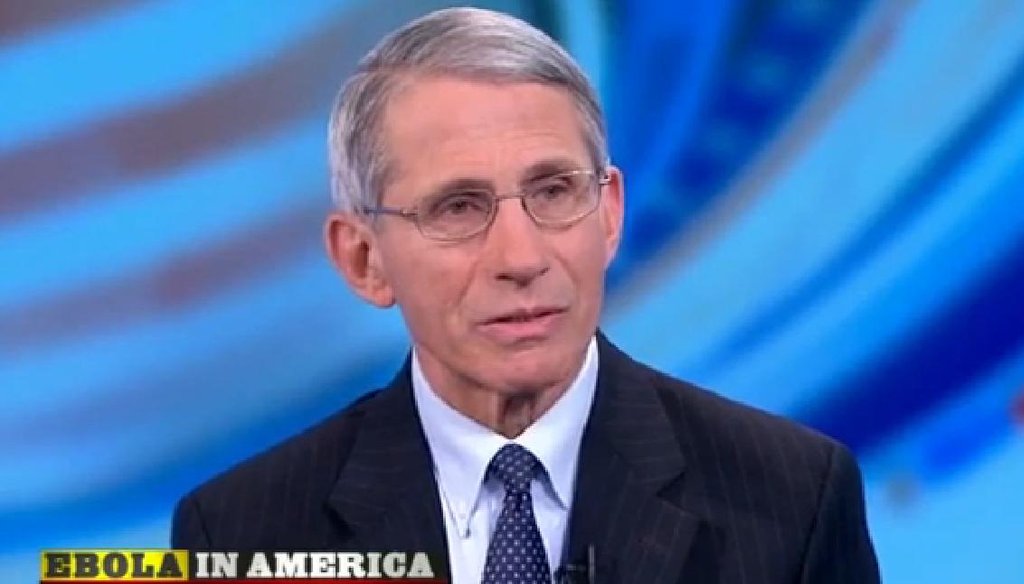Get PolitiFact in your inbox.

If you watched Sunday, you no doubt saw Dr. Anthony Fauci, head of the National Institute of Allergy and Infectious Diseases.
Discussion about the Ebola outbreak in West Africa, and how the virus has spread to the United States, has produced a string of inaccurate claims in recent weeks.
On Sunday, U.S. Rep. Darrell Issa, R-Calif., appeared on CNN’s State of the Union, to address steps the United States is taking to prevent the virus from spreading further her. At one point -- while discussing a decision by governors in Florida, Illinois, New York and New Jersey to start mandatory quarantines -- Issa wrongly said that Ebola victim Thomas Eric Duncan had a fever when he entered the United States.
"We had Mr. Duncan come in with an elevated temperature. We weren't checking it, and now we're playing catch-up," Issa said.
Issa is accurate that U.S. officials did not check Duncan’s temperature when he entered the United States Sept. 20. But there is no evidence Duncan had a fever, a symptom of the Ebola virus, when he entered the country.
Here’s what we know.
Duncan arrived at Dulles International Airport in Washington from Liberia (via Belgium) on Sept. 20. At that point, American airports were not yet screening travelers for possible signs of Ebola.
But Duncan went through screening Sept. 19 in Monrovia, Liberia, where he presented a temperature of 97.3 degrees Fahrenheit. That means he didn’t have a fever when he boarded the plane, according to the Centers for Disease Control and Prevention officials who reviewed Duncan’s Liberian airport screening record.
We (and Issa) can’t know with certainty if Duncan had acquired a fever by the time he arrived at Dulles. But he did not report falling ill until several days later, when he went to the hospital Sept. 25 with a 100.1 degree fever.
It was during this first visit to Texas Health Presbyterian Hospital that Duncan wasn’t examined appropriately. The nurse documented that Duncan had a temperature of 100.1 degrees. It was only after a physician examined him that she included in his record that he had recently arrived from Africa. He was discharged early next morning.
He returned to the hospital Sept. 28 and died there about 10 days later.
We should note that Liberian authorities said Duncan lied on the airport Ebola screening questionnaire by answering "no" to questions about whether he had contact with an Ebola patient or cared for one or touched the body of someone who had died of Ebola. It was found out later that Duncan helped carry 19-year-old Marthalene Williams into a taxi to go to the hospital. She was seven months pregnant and was turned away at the hospital due to lack of space in the Ebola ward; she died several hours later. It is unclear whether Duncan knew of her diagnosis.
Ebola wasn’t the only topic of conversation on the Sunday shows. Though we’re still not past the 2014 midterm elections, politicians and pundits couldn’t help but look forward to the 2016 presidential election.
On ABC’s This Week, Rep. Adam Kinzinger, R-Ill., said he was excited by the prospects of Jeb Bush, Chris Christie or Paul Ryan running. But there was one Republican he’s hoping stays out of the race.
"The one person I don't want to see is somebody like a Rand Paul who has put out budgets to cut the military in half," Kinzinger said of the Kentucky senator. "I think that would be devastating for our party right now."
Kinzinger is correct that Paul proposed spending reductions to the Department of Defense. But his figures are off, and he’s missing some pretty important context.
In his first year in the Senate in 2011, Paul introduced a proposal that was intended to drastically cut spending to balance the budget by 2016. To do so, Paul took measures to cut entire departments like the Department of Education, turn Medicaid and food stamps into block-grant programs and, yes, include a "draw-down and restructuring of the Department of Defense."
According to Paul’s plan, defense outlays would drop from $712 billion in 2011 to $641 billion in 2012 and continue to fall to $548 billion in 2016. Paul accomplishes this largely by cutting overseas operational costs and war spending from $159 billion to nothing by 2016. The rest of the defense budget drops a bit but actually remains relatively flat.
Overall, Paul’s budget represents a reduction in defense spending of about 23 percent compared to 2011 levels. That’s significant, but far from the 50 percent cut Kinzinger claimed. If you account for spending rising for inflation, Paul’s cut would have been around 30 percent.
In 2013, however, Paul released another budget proposal that reversed course.
Under Paul’s revised budget, defense appropriations would go from $521 billion in 2014 to $634 billion in 2023. The Congressional Budget Office, meanwhile, projected $588 billion in defense appropriations in 2014 to $731 billion in 2023.
Our Sources
See individual fact-checks.
















































